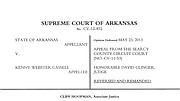Because he illegally possessed stolen frozen Tyson game hens in 1979, Searcy County Sheriff Kenny Cassell is prohibited by the Arkansas Constitution from serving as Searcy County sheriff, the state Supreme Court ruled Thursday.
The court unanimously found that the Searcy County Circuit Court was wrong to dismiss a petition seeking to remove Cassell as sheriff and collector for the county. The lower court’s ruling was reversed and remanded so the removal proceedings could continue.
“Once it has been determined that a party has committed an ‘infamous crime,’ that party is ineligible to hold public office. An ‘infamous crime’ by its nature impugns the integrity of the office and directly impacts the person’s ability to serve as an elected official,” Justice Cliff Hoofman wrote in the majority opinion.
Justices Karen Baker and Jo Hart did not participate in the case. Special Justices Causley Edwards and Donald Raney were appointed by the governor to replace them.
In October 1979, while Cassell was serving as a sheriff’s deputy in the county, he pleaded guilty to a federal misdemeanor violation involving embezzlement or theft of interstate or foreign shipments by carrier and was sentenced to one year in prison. He was required to spend 30 days behind bars with 11 months suspended, and pay a $300 fine.
The charge concerned Cassell’s possession of less than $100 worth of Cornish hens that belonged to Tyson Foods Inc. and were headed from Springdale to Maryland.
Cassell acknowledged the conviction in a political advertisement in October 2009 but was elected sheriff anyway in November 2010.
After offering Cassell the opportunity to resign, Cody Hiland, the 20th Judicial District prosecuting attorney, filed a petition to remove Cassell from office on Oct. 31, 2011, arguing that theft was an “infamous crime” under the Arkansas Constitution and made Cassell ineligible to hold the office.
But Cassell refused to leave and was re-elected in November.
Article 5, Section 9 of the state constitution states: “No person hereafter convicted of embezzlement of public money, bribery, forgery or other infamous crime, shall be eligible to the General Assembly or capable of holding any office of trust or profit in this State.”
On Sept. 4, 2012, Special Judge David Clinger granted Cassell’s motion for summary judgment and dismissed the petition, ruling that the state needed to follow a “ two-step approach,” which Cassell’s attorney said the state had used in a similar case.
“Specifically, the court found that theft by receiving was a crime involving dishonesty that qualified as an ‘infamous crime,’ but it found that the State had failed to establish that the conviction directly impacted Sheriff Cassell’s ability to serve as an elected official or impugned the integrity of the office of Searcy County Sheriff” because voters knew of the conviction when he was elected, Hoofman wrote.
But the state argued that Clinger’s “two-step approach” circumvented what was already clear in the state constitution.
Hoofman and the court agreed, citing a previous case in which a mayor was re-elected after charges were filed against him and another in which a mayor was convicted of misdemeanor theft. Both cases supported the state’s argument, Hoofman wrote.
Hiland said in an interview Thursday that his office was working with Cassell’s attorney to find out what the next steps would be.
“I think the outcome is fairly certain,” Hiland said.
Cassell’s attorney, Joe Don Winningham of Conway, said that, to his knowledge, Cassell has not resigned since the Supreme Court released its decision.
“Kenny Cassell is a good person and a genuine public servant,” Winningham said. “I know he and his wife will continue to serve their community as they have for the past 30 years. I am disappointed for the voters and the people of Searcy County.”
This year, the Arkansas Legislature passed a law, Act 724, clarifying what is meant by an “infamous crime,” saying it covers a range of offenses, including those that contain “some element of deceitfulness, untruthfulness or falsification.” It goes into effect in August.
In other business, the court ruled that the mayor of McRae, Bob Sullivan, has sovereign immunity and can’t be successfully sued by the city’s former police chief, Mary Coney. Coney maintained she had been wrongfully terminated by Sullivan.
The court returned the case to the White County Circuit Court for further proceedings.
Information for this article was contributed by Debra Hale-Shelton of the Arkansas Democrat-Gazette.
Front Section, Pages 1 on 05/24/2013


